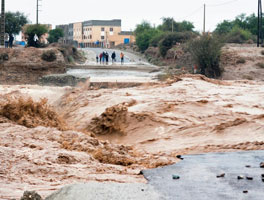 |
Dear readers,
Welcome to the Climate Weekly newsletter by the Centre for Science and Environment’s Climate Change programme and Down to Earth.
If there was ever a real-world demonstration of what the doctor ordered versus how the patient responded, this past weekend was a crucial moment for climate action observers.
The United Nations published its first every Global Stocktake synthesis report – a report card of how the world is faring on tackling climate change since it signed the Paris Agreement in 2015. We are “not on track” to meet the long-term goal of limiting global temperatures to 2 degrees Celsius, it warns, as Tamanna Sengupta of CSE’s Climate Change programme writes. The report acknowledged that improved climate pledges from countries with ambitious emissions reduction targets have led to near-universal climate action. However, the progress is inadequate and the window to “course correct” is rapidly closing.
A day after the launch of the GST report, the G20 countries met in New Delhi and achieved “consensus” on their declaration document with much fanfare. The G20’s statements are not legally binding, but provide signals of intent (or lack thereof) by the 20 world powers to act on climate change. And this year’s declaration was a mixed bag, as we wrote. The most promising outcome for climate and energy deliberations was the commitment to triple the global renewable energy (RE) capacity by 2030. This was coupled with a significant statement on finance — the recognition that low-cost financing is needed for the energy transition in developing countries. Both goals are strongly supported by CSE.
But the lack of a commitment to phase down fossil fuels in an equitable manner show that fossil fuel-producing economies continue to hinder climate progress. Unless we see a meaningful scaling down of fossil fuel power generation and consumption, led by wealthy countries of the Global North, in parallel with RE development, the promise of RE investment cannot make a transformative dent in global emissions.
Elsewhere, CSE researchers discuss how India can achieve ‘sustainable cooling’. And the Africa Climate Summit received mixed reactions, with activists, members of civil society, energy and health experts, criticizing it for not being inclusive and radical enough. You can register here for CSE’s upcoming training programmeGlobal Online Certificate Course: Demystifying Environment Data and Maps for Communication in the 21st Century.
|
|
 |
| |
 |
|
| |
 |
 |
| |
By - Avantika Goswami
Climate Change, CSE
|
| |
|
 |
|
|
| |
 |
|
| |
| EXTREME WEATHER TRACKER |
| |
Africa Climate Summit 2023: Continent experienced warmer year in 2022, warming most rapid in Northern Africa, 07 September 2023
|
 |
 |
|
|
| |
 |
|
| |
 |
 |
Intense, widespread marine heatwaves happening now may extend to February 2024: WMO agency, 07 September 2023
|
|
|
| |
 |
|
| |
|
|
| |
|
|
| |
|
|
| |
 |
|
| |
|
|
| |
 |
|
| |
|
|
| |
 |
|
| |
|
|
| |
 |
|
| |
CLIMATE NEWS | SCIENCE| IMPACTS| POLITICS |
|
| |
 |
|
| |
|
|
| |
 |
|
| |
|
|
| |
 |
|
| |
|
|
| |
 |
|
| |
|
|
| |
 |
|
| |
|
|
| |
 |
|
| |
|
|
| |
 |
|
| |
|
|
| |
 |
|
| |
|
|
| |
 |
|
| |
|
|
| |
 |
|
| |
|
|
| |
 |
|
| |
|
|
| |
 |
|
| |
|
|
| |
 |
|
| |
|
|
| |
 |
|
| |
|
|
| |
 |
|
| |
|
|
| |
 |
|
| |
|
|
| |
 |
|
| |
|
|
| |
 |
|
| |
|
|
| |
|
|
| |
|
|
| |
|
|